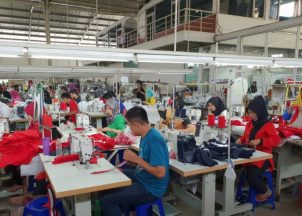
The Indonesian textile and textile product (TPT) industry is currently on the brink of crisis due to a flood of imported products, both legal and illegal. This situation has prompted the Indonesian Fiber and Filament Yarn Producers Association (APSyFI) to urge the government to take immediate and decisive action to save this sector, which is one of the backbones of the national industry.
In a discussion with the Coordinating Ministry for Economic Affairs, APSyFI Secretary General Farhan Aqil Syauqi revealed that textile product imports are currently growing much faster than exports. As a result, the TPT trade balance has plummeted from around USD 6 billion to just USD 2.4 billion in 2024.
"Many raw material import facilities, such as KITE, PLB, KB, and GB, are being misused to import finished goods. Now the domestic market is flooded with cheap imported products, especially from China," Farhan said in a statement in Jakarta on Thursday (October 9).
He explained that free trade agreements such as the ASEAN-China Free Trade Area (ACFTA) have exacerbated the situation by paving the way for Chinese products at very low prices. This has suppressed the competitiveness of domestic industries, which are now losing market share, especially in downstream sectors such as fabrics and apparel.
In fact, the textile and textile industry plays a vital role in the national economy. This sector directly employs around 3.7 million workers, with a domestic market value reaching USD 17 billion and a business turnover of around USD 35 billion. Indonesia even ranks fifth in the world in polyester production capacity and second in rayon, demonstrating its enormous potential if supported by the right policies.
"If import policies remain lax while our upstream industry dies, there is no future for national textiles," Farhan asserted.
To address this situation, APSyFI proposes three main policy directions: strengthening trade regulations, increasing industrial competitiveness, and medium-term policies towards raw material independence.
In terms of trade, APSyFI requests that all textile and textile products with HS codes 50–63 must obtain an import permit (PI) from the Ministry of Trade based on technical considerations from the Ministry of Industry. The import quota mechanism must also be thoroughly evaluated to ensure transparency and freedom from import manipulation. Furthermore, supervision of SNI (Indonesian National Standards), K3L (Oil and Gas Safety), and Indonesian language labels must be returned to the point of entry (border) to strengthen controls.
Farhan emphasized the importance of enforcing anti-dumping, anti-subsidy, and safeguard regulations, as well as eradicating illegal imports. "The government must reject any form of import relaxation that weakens the domestic industry," he said.
To increase competitiveness, APSyFI encourages the price of industrial gas to be set at a maximum of USD 6 per mmbtu, equivalent to that of competing countries such as India. Furthermore, the government is expected to provide final tax incentives for apparel products, as well as access to green and affordable financing for industries using local or recycled raw materials.
Meanwhile, in terms of medium-term policy, APSyFI believes it is necessary to implement mandatory Domestic Component Level (TKDN) and SNI requirements for the domestic market, along with strengthening local brands and supporting national e-commerce platforms for small and medium-sized enterprises (SMEs). The industrial transformation towards the green and digital era (Industry 4.0) is also considered crucial for the sustainability of this sector.
"National logistics efficiency, including improvements to rail and port transportation, as well as the development of the domestic petrochemical industry, is key to ensuring the supply of strategic raw materials," explained Farhan.
With this comprehensive strategy, APSyFI is optimistic that the government can restructure import policies and strengthen industrial integration from upstream to downstream. The target is for 85% of the domestic market to be dominated by local products, the contribution to GDP to increase from 1.1% to 2.6%, and employment to rise to 5.5% per year.
"We are targeting annual growth of the textile and textile industry (TPT) of 16.5% until 2035, with exports increasing by 9.7% per year and imports decreasing by 26% within a decade," concluded Farhan.
